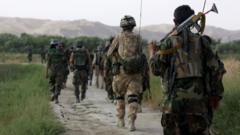This article details the recent outcome of Ben Roberts-Smith's defamation case, which has significant implications for perceptions of military conduct and media freedom in Australia.
Ben Roberts-Smith's Defamation Appeal Over War Crimes Case Denied

Ben Roberts-Smith's Defamation Appeal Over War Crimes Case Denied
Top Australian military figure loses landmark appeal regarding allegations of war crimes, triggering nationwide discourse on accountability and journalistic ethics.
Ben Roberts-Smith, Australia's most decorated living soldier, has suffered a setback in his defamation battle concerning allegations of war crimes, as a panel of three Federal Court judges upheld a ruling from 2023 that found the soldier committed serious misconduct. This case is pivotal as it marks the first instance of a court evaluating claims of war crimes involving Australian forces.
Roberts-Smith's appeal argued that the initial judgment by Justice Antony Besanko contained legal flaws. In his defense, Roberts-Smith maintained his innocence in the face of allegations claiming he murdered four unarmed Afghans, occurring during his deployment in Afghanistan from 2009 to 2012. The allegations surfaced in articles published by The Age, The Sydney Morning Herald, and The Canberra Times in 2018 when he was viewed as a national hero.
The defamation trial, often referred to as "the trial of the century," lasted over 120 days, and its financial repercussions are reportedly around A$35 million (approximately $22.5 million). The case sparked intense public interest not just due to the charges but also regarding the accountability of military personnel and the integrity of journalistic practice.
Justice Besanko's contention was that the evidence substantiated claims of murder and bullying, concluding that Roberts-Smith had lied to conceal his actions. Certain allegations of domestic violence and additional murders were, however, not sufficiently proven to meet the civil standard of "balance of probabilities."
Roberts-Smith's barrister, Bret Walker, emphasized the importance of acknowledging the presumption of innocence, arguing that it was not sufficiently considered in the original judgment. The legal community continues to watch the proceedings closely as the complexities of military and civilian law unfold before the Australian courts.


















